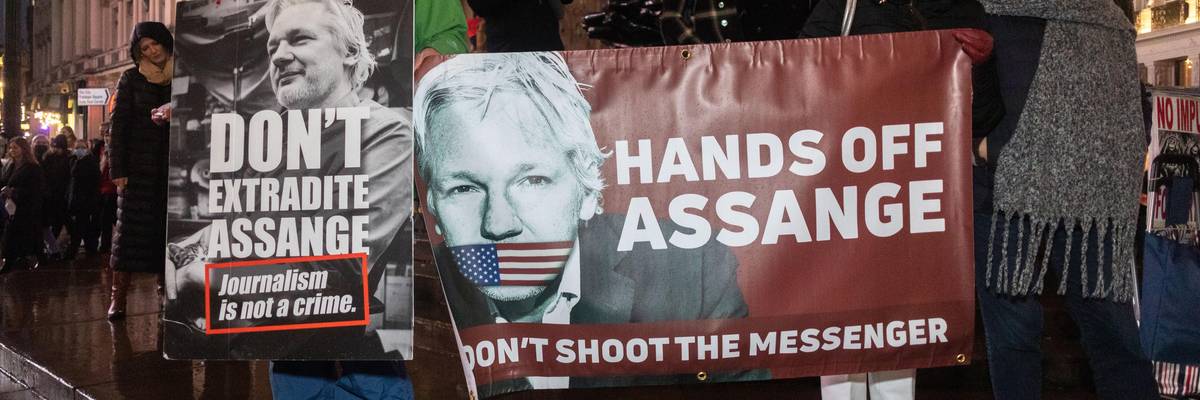

SUBSCRIBE TO OUR FREE NEWSLETTER
Daily news & progressive opinion—funded by the people, not the corporations—delivered straight to your inbox.
5
#000000
#FFFFFF
To donate by check, phone, or other method, see our More Ways to Give page.


Daily news & progressive opinion—funded by the people, not the corporations—delivered straight to your inbox.

Protesters demonstrate against the possible extradition of WikiLeaks co-founder and publisher Julian Assange in London on December 11, 2021. (Photo: Belinda Jlao/SOPA Images/LightRocket via Getty Images)
Press freedom campaigners on Wednesday marked Julian Assange's 1,000th day of imprisonment in London's Belmarsh Prison with renewed demands for the WikiLeaks publisher's freedom ahead of his looming potential extradition to the United States.
" Journalism is not a crime," the Assange Defense Committee tweeted. "#FreeAssange. #DropTheCharges."
Assange's partner Stella Morris said in a statement: "It will be 1,000 days this Wednesday that Julian Assange has spent in the harshest prison in the U.K. His young children, ages two and four, have no memory of their father outside the highest security prison of the U.K."
The likelihood of Assange's extradition to the United States--where he faces charges of violating the Espionage Act that, if he is convicted, could result in a more than 170-year prison sentence--increased last month after the U.S. won an appeal in the U.K. High Court. Assange can still appeal to the country's Supreme Court, but there is no guarantee it will consider his case.
Morris and other advocates have previously drawn attention to conditions at Belmarsh, Britain's first supermax prison, where violence, prisoner self-harm, and Covid-19 are rampant. Assange's numerous maladies--Morris said he suffered a mini-stroke in October, and he also has heart and respiratory ailments--place the 50-year-old at elevated risk of potentially deadly Covid-19 complications, health experts say.
Related Content

According to the United Nations Working Group on Arbitrary Detention, Assange has been arbitrarily deprived of his freedom since he was arrested on December 7, 2010. Since then he has been held under house arrest, confined for seven years in the Ecuadorean Embassy in London while he was protected by the administration of former Ecuadorean President Rafael Correa, and jailed in Belmarsh.
"The U.S. government is trying to put an Australian publisher on trial in a U.S. national security court, where he faces a 175-year sentence and imprisonment in conditions of torture and total isolation, simply because he was doing his job," Morris said. "He received true information about the victims and the crimes committed by U.S. operations in Guantanamo Bay, Afghanistan, and Iraq from Chelsea Manning, and he published it."
\u201c"The future of journalism is at stake - it will not stop with Julian Assange" #FreeAssangeNOW\u201d— WikiLeaks (@WikiLeaks) 1641385445
Among the materials published by WikiLeaks are the infamous "Collateral Murder" video showing a U.S. Army helicopter crew laughing while killing a group of Iraqi civilians, the Afghan War Diary, and the Iraq War Logs, all of which revealed U.S. and allied war crimes.
"Julian Assange has not been proven guilty of any crime, nor has he been tried in a court of law. And yet he is in the maximum-security prison in Belmarsh," Hendrick Zorner, press officer of the German Federation of Journalists (DJV), said in a statement. "The British authorities do not care that his health and mental health are a wreck. They behave towards Assange as one would expect from a banana republic, but not from a constitutional state."
"Unfortunately, international outrage about this is limited," Zorner added. "One thing is clear: WikiLeaks has shown the world American war crimes. Julian Assange deserves thanks and recognition for this, not a life sentence."
Dear Common Dreams reader, The U.S. is on a fast track to authoritarianism like nothing I've ever seen. Meanwhile, corporate news outlets are utterly capitulating to Trump, twisting their coverage to avoid drawing his ire while lining up to stuff cash in his pockets. That's why I believe that Common Dreams is doing the best and most consequential reporting that we've ever done. Our small but mighty team is a progressive reporting powerhouse, covering the news every day that the corporate media never will. Our mission has always been simple: To inform. To inspire. And to ignite change for the common good. Now here's the key piece that I want all our readers to understand: None of this would be possible without your financial support. That's not just some fundraising cliche. It's the absolute and literal truth. We don't accept corporate advertising and never will. We don't have a paywall because we don't think people should be blocked from critical news based on their ability to pay. Everything we do is funded by the donations of readers like you. Will you donate now to help power the nonprofit, independent reporting of Common Dreams? Thank you for being a vital member of our community. Together, we can keep independent journalism alive when it’s needed most. - Craig Brown, Co-founder |
Press freedom campaigners on Wednesday marked Julian Assange's 1,000th day of imprisonment in London's Belmarsh Prison with renewed demands for the WikiLeaks publisher's freedom ahead of his looming potential extradition to the United States.
" Journalism is not a crime," the Assange Defense Committee tweeted. "#FreeAssange. #DropTheCharges."
Assange's partner Stella Morris said in a statement: "It will be 1,000 days this Wednesday that Julian Assange has spent in the harshest prison in the U.K. His young children, ages two and four, have no memory of their father outside the highest security prison of the U.K."
The likelihood of Assange's extradition to the United States--where he faces charges of violating the Espionage Act that, if he is convicted, could result in a more than 170-year prison sentence--increased last month after the U.S. won an appeal in the U.K. High Court. Assange can still appeal to the country's Supreme Court, but there is no guarantee it will consider his case.
Morris and other advocates have previously drawn attention to conditions at Belmarsh, Britain's first supermax prison, where violence, prisoner self-harm, and Covid-19 are rampant. Assange's numerous maladies--Morris said he suffered a mini-stroke in October, and he also has heart and respiratory ailments--place the 50-year-old at elevated risk of potentially deadly Covid-19 complications, health experts say.
Related Content

According to the United Nations Working Group on Arbitrary Detention, Assange has been arbitrarily deprived of his freedom since he was arrested on December 7, 2010. Since then he has been held under house arrest, confined for seven years in the Ecuadorean Embassy in London while he was protected by the administration of former Ecuadorean President Rafael Correa, and jailed in Belmarsh.
"The U.S. government is trying to put an Australian publisher on trial in a U.S. national security court, where he faces a 175-year sentence and imprisonment in conditions of torture and total isolation, simply because he was doing his job," Morris said. "He received true information about the victims and the crimes committed by U.S. operations in Guantanamo Bay, Afghanistan, and Iraq from Chelsea Manning, and he published it."
\u201c"The future of journalism is at stake - it will not stop with Julian Assange" #FreeAssangeNOW\u201d— WikiLeaks (@WikiLeaks) 1641385445
Among the materials published by WikiLeaks are the infamous "Collateral Murder" video showing a U.S. Army helicopter crew laughing while killing a group of Iraqi civilians, the Afghan War Diary, and the Iraq War Logs, all of which revealed U.S. and allied war crimes.
"Julian Assange has not been proven guilty of any crime, nor has he been tried in a court of law. And yet he is in the maximum-security prison in Belmarsh," Hendrick Zorner, press officer of the German Federation of Journalists (DJV), said in a statement. "The British authorities do not care that his health and mental health are a wreck. They behave towards Assange as one would expect from a banana republic, but not from a constitutional state."
"Unfortunately, international outrage about this is limited," Zorner added. "One thing is clear: WikiLeaks has shown the world American war crimes. Julian Assange deserves thanks and recognition for this, not a life sentence."
Press freedom campaigners on Wednesday marked Julian Assange's 1,000th day of imprisonment in London's Belmarsh Prison with renewed demands for the WikiLeaks publisher's freedom ahead of his looming potential extradition to the United States.
" Journalism is not a crime," the Assange Defense Committee tweeted. "#FreeAssange. #DropTheCharges."
Assange's partner Stella Morris said in a statement: "It will be 1,000 days this Wednesday that Julian Assange has spent in the harshest prison in the U.K. His young children, ages two and four, have no memory of their father outside the highest security prison of the U.K."
The likelihood of Assange's extradition to the United States--where he faces charges of violating the Espionage Act that, if he is convicted, could result in a more than 170-year prison sentence--increased last month after the U.S. won an appeal in the U.K. High Court. Assange can still appeal to the country's Supreme Court, but there is no guarantee it will consider his case.
Morris and other advocates have previously drawn attention to conditions at Belmarsh, Britain's first supermax prison, where violence, prisoner self-harm, and Covid-19 are rampant. Assange's numerous maladies--Morris said he suffered a mini-stroke in October, and he also has heart and respiratory ailments--place the 50-year-old at elevated risk of potentially deadly Covid-19 complications, health experts say.
Related Content

According to the United Nations Working Group on Arbitrary Detention, Assange has been arbitrarily deprived of his freedom since he was arrested on December 7, 2010. Since then he has been held under house arrest, confined for seven years in the Ecuadorean Embassy in London while he was protected by the administration of former Ecuadorean President Rafael Correa, and jailed in Belmarsh.
"The U.S. government is trying to put an Australian publisher on trial in a U.S. national security court, where he faces a 175-year sentence and imprisonment in conditions of torture and total isolation, simply because he was doing his job," Morris said. "He received true information about the victims and the crimes committed by U.S. operations in Guantanamo Bay, Afghanistan, and Iraq from Chelsea Manning, and he published it."
\u201c"The future of journalism is at stake - it will not stop with Julian Assange" #FreeAssangeNOW\u201d— WikiLeaks (@WikiLeaks) 1641385445
Among the materials published by WikiLeaks are the infamous "Collateral Murder" video showing a U.S. Army helicopter crew laughing while killing a group of Iraqi civilians, the Afghan War Diary, and the Iraq War Logs, all of which revealed U.S. and allied war crimes.
"Julian Assange has not been proven guilty of any crime, nor has he been tried in a court of law. And yet he is in the maximum-security prison in Belmarsh," Hendrick Zorner, press officer of the German Federation of Journalists (DJV), said in a statement. "The British authorities do not care that his health and mental health are a wreck. They behave towards Assange as one would expect from a banana republic, but not from a constitutional state."
"Unfortunately, international outrage about this is limited," Zorner added. "One thing is clear: WikiLeaks has shown the world American war crimes. Julian Assange deserves thanks and recognition for this, not a life sentence."